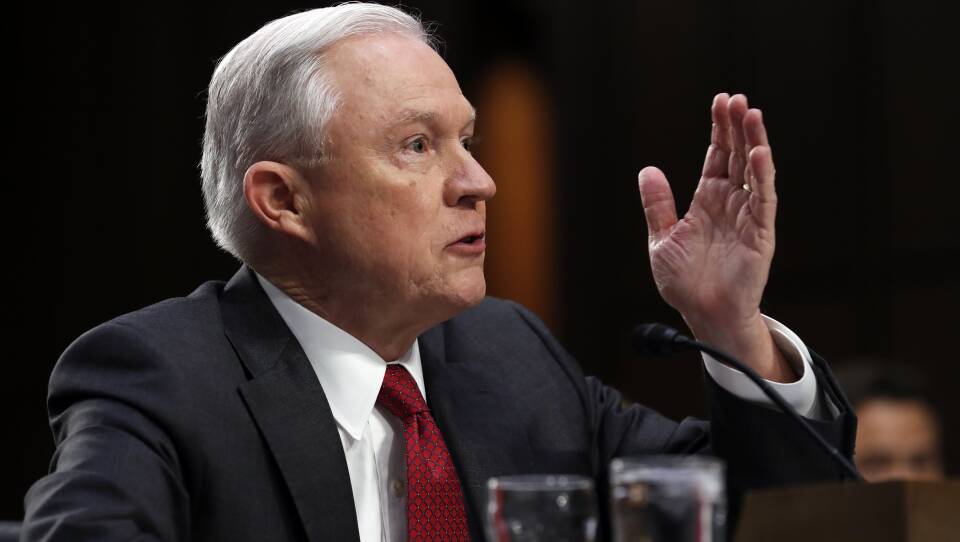Much of the nation was transfixed by Attorney General Jeff Sessions’ testimony before the Senate Intelligence Committee on Tuesday. Sessions came out swinging, calling any insinuation that he colluded with the Russian government “an appalling and detestable lie.”
The hearing may have raised more questions about Sessions’ role in the firing of James Comey, the former FBI director who was investigating the Trump campaign’s ties to Russia. And questions still swirl around Sessions in light of reporting that the attorney general failed to disclose information about meetings with Russian officials in applying for his security clearance.
During the hearing on Tuesday, Sessions denied these allegations in no uncertain terms. “I have never met with or had any conversations with any Russians or any foreign officials concerning any type of interference with any campaign or election,” he said during his opening statement. “Further, I have no knowledge of any such conversations by anyone connected to the Trump campaign.”
But, while pundits consider the political fallout of Sessions’ testimony, there’s another legal matter that deserves some attention: the status of the complaints filed against Sessions with the Alabama state bar.
Sessions has held his law license in the state of Alabama since 1973. Attorneys are largely self-regulated, beholden to ethical rules adopted in the states where they are licensed to practice and enforced by disciplinary boards composed of other lawyers. (The phrase the “fox watching the henhouse” comes to mind.) Disciplinary boards seldom impose discipline on misbehaving lawyers, let alone powerful members of the bar. Yet ethics rules, in theory, are a key safeguard against misconduct.
The complaints are largely based on testimony Sessions gave during his confirmation hearing in January. At that hearing, Sessions stated, “I did not have communications with the Russians” in response to a question about whether “anyone affiliated with the Trump campaign” may have interacted with Russian officials. Sessions also answered “no” to a question posed in writing that asked, “Have you been in contact with anyone connected to any part of the Russian government about the 2016 election, either before or after election day?” Yet, it later emerged that Sessions had met with Russian Foreign Ambassador Sergi Kislyak on at least two occasions in 2016, though he denied Tuesday that they talked about the election.
Under the Alabama rules, anyone can file a complaint against an attorney licensed in that state. It doesn’t matter that Sessions works in Washington, D.C. Several citizens capitalized on this opportunity by submitting complaints against Sessions, including Boston lawyer J. Whitfield Larrabee and Christopher Anders, the deputy director of the ACLU. While we know little about the inner workings of Alabama’s disciplinary commission — pending investigations are kept confidential — we do have an inkling about the claims against Sessions.
The ACLU, which released its complaint publicly, contends that Sessions violated an Alabama Rule of Professional Conduct that cautions lawyers not to “engage in conduct involving dishonesty, fraud, deceit, or misrepresentation.” Lawyers in public office “assume legal responsibilities going beyond those of other citizens. A lawyer’s abuse of public office can suggest an inability to fulfill the professional role of attorney,” the commentary to the rules further state. Despite his testimony to the Senate Intelligence Committee, there is a sound argument that during his confirmation hearing Sessions misrepresented the nature of his dealings with the Russians, especially given the heightened responsibilities borne by lawyers “holding public office.”
Sessions may have violated another, more technical rule that states lawyers owe a “duty of candor” and may not “knowingly . . . make a false statement of material fact or law to a tribunal.” Even assuming Sessions made “a false statement of material fact,” this claim faces two obstacles. First, did he do so “knowingly”? The Alabama rules define “knowingly” as “actual knowledge.” Sessions will likely claim he did not actually know that his statements were false because he either did not recall the meetings or considered the meetings pertinent to his role as a senator rather than as an adviser to the Trump campaign. Second, the term “tribunal” typically refers to a court, which reinforces the idea that this rule applies to litigation or a courtroom setting.
Finally, Sessions may find himself caught by a catchall provision that deems it professional misconduct for a lawyer to engage “in any other conduct that adversely reflects on his fitness to practice law.” Even if Sessions did not engage in “misrepresentation” or “knowingly” provide “a false statement of material fact” to a “tribunal,” his behavior at the confirmation hearing appears to call into question his fitness to practice law and, even more, to serve as the nation’s chief prosecutor.
Whether the Alabama bar is brave enough to make such a finding remains to be seen.




